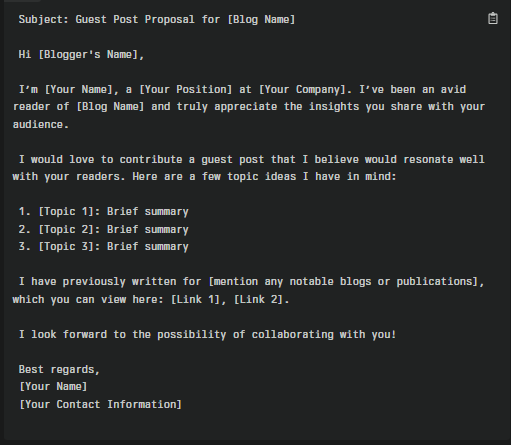In the digitized world where collaboration crosses multiple borders, guest posting stands out as one of these cooperative benefit mutual knowledge sharing practices. This technique involves a series of authors from different sites writing articles for websites other than their own, thereby furthering knowledge sharing across various audiences. Among the many tactics available for digital growth, guest posting started in the days of early blogging, characterized by a collaborative spirit, sharing audiences, and an enthusiasm for swapping knowledge. However, the impact of guest posting spreads broader into SEO and practices in digital marketing.

In today's digital realm, backlinks dictate a website's rank in search engines. Thus, guest posting is one way of acquiring scarce backlinks in an ethical sense rather than resorting to the opposite norm of manipulating search rankings. Therefore, guest posting is a content-driven way towards mutualistic relationships. The host site wins expert content to engage the audience while the guest author generates a backlink that will improve the credibility of their website in search engines.
Besides making a difference to SEO, guest posting further allows contributors to establish expertise, give alternative insights, and create a fresh content pool for readers. Potential experts navigating the tech world churn out the diversification of portfolios and skill refinement, which otherwise may not be considered, all because of collaborative measures. Ties from guest posting can develop into professional networks, allowing professional collaborations to transcend guest posting.
What Is Guest Posting? The Ultimate Guide to Guest Blogging 2025

Difference between Guest posting and regular Blogging
What are the differences between the two most distinct avenues of content distribution: guest posting and regular blogging? Although they essentially pertain to the generation and dissemination of content into the online realm, closer observation shows that these practices have nuances that make them stand out from each other, each invaluable to communication and engagement. These are the differences that help to understand better what is good for posting.
Websites Ownership:
Guest Posting: The core purpose of guest posting lies in the ability to write content for others. Here, an expert can walk in as a guest, sharing your insights on another's platform.
Regular Blogging: Regular blogging involves publishing articles on your website or blog. Here, you own entirely, and all are within your control of content creation, presentation, and promotion.
Purpose & Objectives:
Guest Blogging: This technique mainly aims to broaden outreach. Guest bloggers try to reach a larger audience, earn backlinks, and establish themselves as authorities in their chosen niche or industry.
Regular Blogging: Even though some of the objectives might overlap, regular blogging has a dual focus. It accommodates existing viewership and also tries to maintain site SEO, nurture the current audience, and drive a constant flow of innovative content on a daily basis.
Editorial Control
Guest Blogging: When blogging, writers often experience editorial procedures on the host site. This may include editing and following specific recommendations of the site hosting it.
Regular Blogging: In a regular blog posting environment, one is in full control of one's work. This includes decisions over content flow, format, and when it shall be posted.
Audience Engagement:
Guest Blogging: Guest blogging engagement is mainly targeted towards a new or unknown audience. This provides an excellent chance to make an impression and potentially gather some followers or customers while also promoting yourself as a specialist in that subject niche.
Regular Blogging: With blog posting, on the other hand, content creation requires engaging with an already-known audience who is familiar with your content. This is in an established context wherein a relationship with the reader has been established and intends to be continued.
Longevity & Maintenance:
Guest Blogging: Now, when a guest blog post goes live, updates can be sparse and are usually made according to the host site's discretion. Any further changes would be at the discretion of the editorial policies and guidelines set by the host, as agreed.
Regular Blogging: Through frequent blogs, you can update, optimize, or even remove the material as required. This gives you complete control over your digital narrative to be both relevant and accurate.
In short, though guest posting and regular blogging are both compelling tactics in their own right as standalone content marketing practices, they are two very different things that demand a good understanding. Recognizing that these two represent very different approaches may empower writers and marketers to make the best use of their content toward its maximum impact. A fitting kind of effort designed according to the specific strengths of the practice would allow creators to align with their own digital footprint, fostering those bonds between their audience, new and old. That would mean guest posting is still a crucial cornerstone of effective content distribution and audience engagement, even as the digital landscape evolves.
What is guest posting in SEO?

Guest posting, also known as guest blogging, is writing for another web site or blog that creates and nurtures your brand or expertise. Such content usually contains a link-back to the author's website-this creates a way for building backlinks, increasing the visibility of a brand, and enhancing authority in a particular niche.It is a strategic approach in SEO that helps improve search engine rankings by acquiring links from reputable sites.
What is a guest posting example? How to reach out ?
Guest posting is an example of a writer contacting a blog owner to write an article relevant to the blog's readers.For instance, a freelance writer specializing in writing about digital marketing may pitch "SEO Tips for Small Businesses" as a guest post to a marketing blog.
In this instance, the author would write the post with the requirements of the blog and put a link to his website in the body of the post.
This serves two purposes: it is useful to the blog readers as it gives them something to read, but it also increases the author's visibility and ranks their site better due to backlinks.
Here's an example of what the outreach email might look like:

Types of Guest Posting
There are different types of guest posting, each with a different approach and strategy in content marketing. The following are some common ones: Expert Roundups—an article involving insights gathered from a particular field and comprising several experts. It generally gives an overview of a topic by featuring the expertise of the contributors.
Influencer Collaborations:
Guest posts made with influencers or opinion leaders can help reach a wide audience and give credibility.
Local Guest Posting:
Writing for local blogs or websites can help build local authority and attract customers within proximity.
Case Studies:
A detailed account showing how a strategy or product has been successfully deployed, showing in-depth applications and results.
How-to Guides are step-by-step articles that help readers complete a certain task or accomplish a specific goal, making complex processes accessible.
Interviews:
Article posts featuring interviews with industry experts, offering unique perspectives and views that give the content value.
Listicles are articles that take the shape of a list and illuminate numerous tips, tools, or resources on a specific issue, making them a more manageable challenge for readers to digest.
Knowing these will help the content creator decide which will work best for their goals in guest posting: establishing authority, driving traffic, or building community connections.
Tips For Getting Started With Guest Posting
A guest posting journey is full of promise to increase your viewership and SEO ranking, but it comes with its hurdles. To set off on the right footing, here are proven tips to guide you through it.
- Research Your Target Blogs: Find blogs in your niche or industry that are willing to accept guest blog posts. Use Serpzilla to discover platforms that might suit your niche.
- Understand Submission Guidelines: Each blog has its own submission requirements. Familiarize yourself with them prior to producing any content to maximize your success potential.
- Create high-quality content: This guest post is like your brand ambassador. Ensure your work is well-researched, thoroughly proofread, and of real value to the new audience it will reach.
- Have a strong bio: Most blogging platforms provide a brief bio section from the author. Use this space to introduce yourself, demonstrate expertise, and include a link back to your website.
- Engage with Your Audience: Once your guest post has been published, engage with the comments and questions. Establishing a rapport can open up more opportunities and wider exposure.
- Promote Your Guest Post: Share your guest post with your own social media circle and blog newsletters to increase viewership and demonstrate commitment to the process of guest posting.
- Establish Relationships: Guest posting is more of a relationship builder than a transaction. Continuous contributions can position you as an authority in your niche.
- Track Conversions: Monitor the outcomes of your guest posts using analytics. Be transparent about measuring traffic, good-quality backlinks, and possible leads from your post.
Remember, guest posting means far more than link building. It is a connection-building process and a value addition for a wider audience. Approach the task with professionalism and a heart to contribute genuinely to your area of success, and it'll work in your favor.
Selecting the right guest posting platforms is the key
In the world of guest posting, finding a suitable platform requires precision. Any old site won't do; you must discover platforms similar to your niche, with interested readers, that promise gains in visibility, authority, and traffic. Below, we explore the methodology for finding the optimal platforms.
- Niche-Centric Blogs: The first tactic is finding prominent blogs in your niche. These websites often boast huge readerships, credibility, and a tendency to crave quality content.
- Multidisciplinary Websites: Multisubject websites can also work as well. As long as the topic falls within the scope of your expertise, a broad-based user base can be leveraged.
- Community Platforms: sites like Linkedin, Medium, and Guestpost.com are examples of community platforms that foster environments where professionals share their insights. These avenues open new doors for reaching audiences and establishing your voice in a chosen niche.
- Using Search Operators: A basic Google search using operators such as "your niche + write for us" or "your niche + guest post guidelines" may unearth multiple platforms actively soliciting contributors.
- Leveraging Personal Contacts: Networking online, offline, or both can open up opportunities for guest posting. Discussions on LinkedIn or within professional forums reveal such opportunities.
Mistakes to Avoid in Guest Posting
The world of guest blogging offers a treasure trove of strategy, but like any strategy, potential pitfalls lurk. In this section, we will outline a catalog of typical mistakes writers and marketers often encounter, along with how to avoid them:
Failure to Observe the Guidelines of the Host Blog: Each blog has its own unique rules, including personal preferences for style, length of content, and positioning of thematic guidelines. Failure to adhere to them can rapidly send your submission to the rejection list.
Publishing Subpar Material: The sign of a guest post should be excellence and expertise. Letting less than this appear undermines your credibility and fails your audience, who is looking for meaningful content from an expert's perspective.
Deploying Generic Pitches: Using a one-size-fits-all pitch tends to miss the point of hitting different audiences. The key is customization—work pitches that resonate with the nuances of each blog, showcase your experience, and do the appropriate amount of research in a way that fully aligns with their readership.
Overuse of marketing: When excessive, guest posts might become another marketing operation. The point is to get value; flooding the piece with advertisements of your products, services, or images can be too much for the reader.
Disregarding SEO principles: Even within the third-party blog department, SEO principles hold sway. Add keywords or topic-related words organically, structure your pieces into subheadings with apt headings, and optimize for search engines.
Missed Opportunities: Failure to respond to readers' comments is a lost opportunity. Similar to the handshake principle, such engagement with readers helps you connect with your audience and may attract new leads in the future.
Missed Opportunity: Failure to cross-promote from your digital channels after your guest post gets published, such as audio on social media, newsletters, and websites, amplifies traffic and bolsters the credibility of you and the hosting blog.
Overlooked Analytical Evaluation: Good information through post-performance analytics is the key. Determine relevant topics, measure the effectiveness of calls to action, and identify traffic movement so that you know exactly how to adjust your guest posts down the road.
Free Guest Posting Site
Check the article for 300+ guest posting sites.
OUTROW
Learning what guest posting is and its multiple kinds can significantly enhance your content marketing strategy. Guest posting is an act where articles are published on other websites to increase exposure, gain authority, or provide backlinks that improve SEO. There are several types of guest posting, including expert roundups, influencer collaborations, local guest posts, and case studies, each for a different purpose: to engage audiences and build credibility.
However, you should not target sites that are irrelevant, low-quality content should not be submitted, and host blog rules must be followed; otherwise, missteps can undermine the effectiveness of one's guest posting effort and lead to a bad reputation.
Ultimately, done well, guest blogging can be a potent SEO tool, driving traffic to your site and raising your visibility in your niche. The right kinds of guest posts and avoiding pitfalls help you use this strategy to answer what guest posting is. It's not a mere tool for generating backlinks but rather more of an all-around approach to relationship-building and identifying oneself as a thought leader in one's field.
Optimixia, your internet marketing agency provides Best Digital Marketing Service , attracts quality traffic from reputable sites, building trust in your brand. We leverage paid ads, sponsorships, and influencer collaborations, while also focusing on guest blogging and social media to create valuable backlinks that drive sales.
Let’s connect! Reach out today to discover Digital World